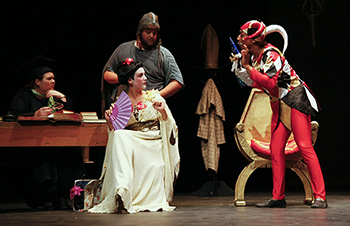Latest News Archive
Please select Category, Year, and then Month to display items
03 October 2018
|
Story UFS
|
Photo Katlego Sekele
 Students engaged authorities and Student Affairs
representatives on sexual and gender-based matters.
Students engaged authorities and Student Affairs
representatives on sexual and gender-based matters.
Do you know enough about the Sexual Harassment, Sexual Misconduct and Sexual Violence policy adopted by the university in June 2018? The Office for Gender and Sexual Equity (GSE) at the University of the Free State (UFS) hosted a dialogue on the role of the institution in matters of sexual and gender-based violence and addressing issues surrounding sexual violations.
Developments such as the countrywide #TotalShutdown: Intersectional Women’s March Against Gender-based Violence last month serve as proof of the dire need for issues surrounding sexual violations to inform policies and active safety measures.
Policy purpose
According to the policy, the objectives are to create a safe and enabling environment, establish a common understanding of what constitutes sexual harassment, sexual misconduct and sexual violence, provide applicable and accurate information, ensure that victims receive the necessary support, clearly outline disciplinary procedures for perpetrators, and clarify institutional accountability.
Student’s take on solutions
Tammy Fray, a member of the Student Representative Council, who formed part of the panel at the discussion, says the policy is not a one-stop-shop solution. “The policy is a guiding document. We have to then use it to inform activist work. We cannot always put the onus on policies and codes of conducts to solve problems. However it is our responsibility within this academic space to come up with solutions that enhance the way the policy works.”
Be informed about the policy
It is important to understand the stipulations of the policy in order to make full use of it. Geraldine Lengau, Officer at the GSE said: “It’s important that students know that the institution is not operating in silos but that their demands have been heard and the institution has acknowledged that there is a need for the policy to be adopted. It also makes the process of reporting better with the assistance of the Sexual Assault Response Team coordinator.”
Drama students awarded National Arts Council bursaries
2016-05-04
 |
The National Arts Council (NAC) has awarded R100 000 to 10 Drama students at the University of the Free State (UFS). Eight years after its establishment in 2005, the NAC has partnered our university in funding academically-deserving students needing assistance with tuition. To date, our undergraduate students have benefitted from more than R800 000.
Prof Nico Luwes, Head of the Department of Drama and Theatre Arts, who applies to the NAC at the end of each year on behalf of students, welcomes the funds: “Quite a lot of our students would not have been able to complete their studies without assistance from the bursary scheme.”
As a result of this financial injection, South African schools also gain. “Some students then enrol for a higher education diploma, and they then teach Arts and Culture at schools. Hence, there is a whole new generation of Arts and Culture teachers who are now entering the school system,” said Prof Luwes.
Mbuyiselo Nqodi, a second-year BA Drama and Theatre Arts student, would not have been able to enrol at the university in 2015, had it not been for the NAC. “Without the bursary, I would not have been admitted into the university. It helped a lot because R10 000 can go a long way.”
Pursuing its mandate to support and develop South Africa’s arts, culture and heritage sector, the NAC awarded 117 bursaries to arts students and tertiary institutions for the year. A total of R5 million has been allocated for 2016, a 10% increase on the previous financial year.
According to the NAC Chief Executive Officer, Rosemary Mangope, one of the aims of the NAC is to provide support to students who will contribute to the arts and culture industry in a meaningful and sustainable manner.